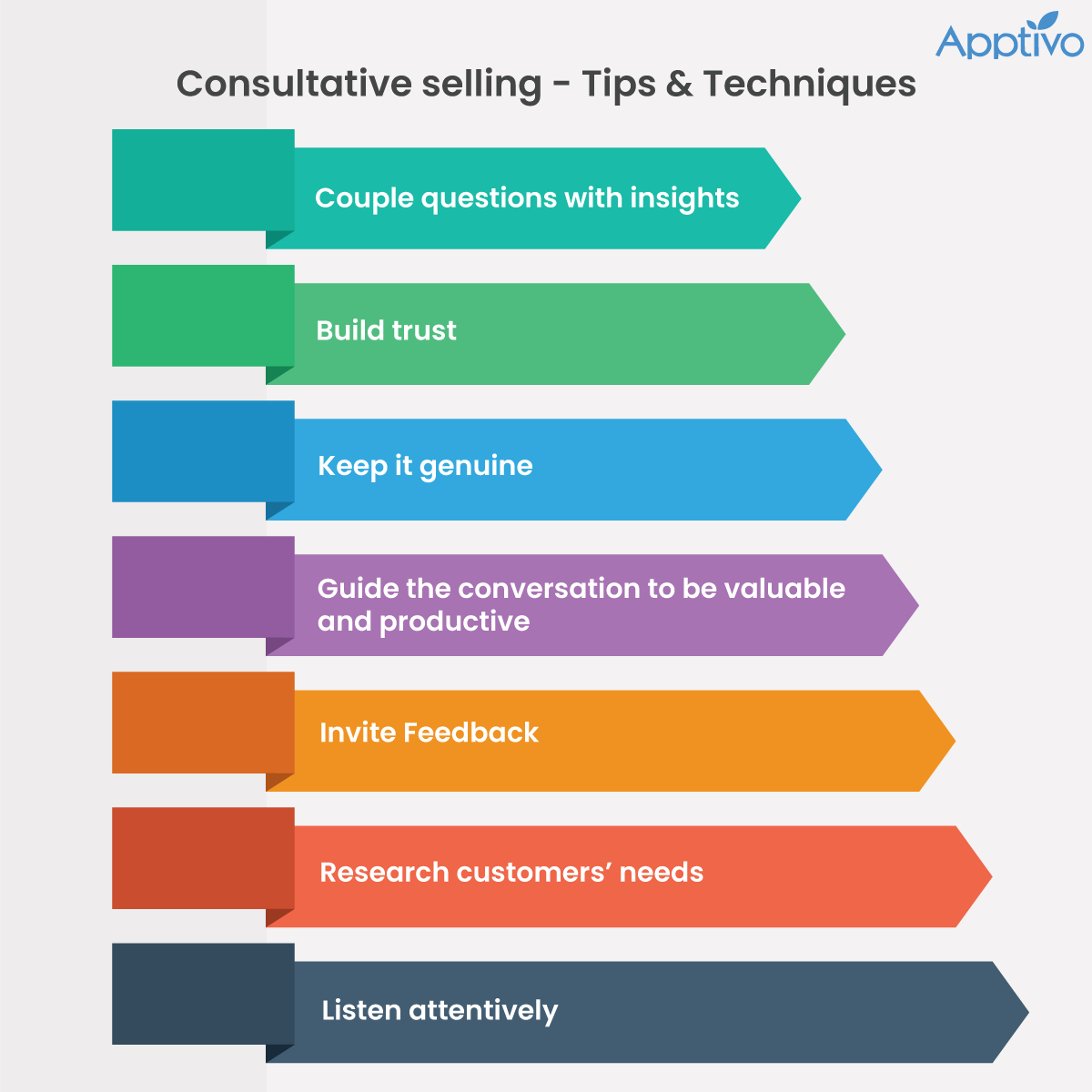 |
Introduction
It is worth noting that buyers want to be understood. As per reports, 84% of buyers are likely to make a purchase from the salespersons who understand their needs & preferences. At the same time, 57% of buyers state that salespersons lack knowledge regarding business.
Buyers relate better with salespersons who can identify business interests, current challenges & needs. When a salesperson employs the principles of consultative selling, buyers find that they are empathetic and relevant and are more likely to engage with them.
What is consultative selling?
Consultative selling is an approach that creates value and builds trust with a prospect while trying to offer solutions and explore their current challenges. Consultative selling uncovers the needs of the customers much faster and presents more effective solutions thereby meeting the two key objectives of a salesperson i.e., i) Providing the right product ii) Building customer relationships.
Consultative selling – Tips & Techniques
 |
1.Couple questions with insights
The sale usually involves understanding the needs of customers. Asking open ended questions and allowing the prospect to explain their current situation will invariably give insights to the solutions the prospect is currently looking for. However, some buyers may not be forthcoming with real challenges, in such cases, it is better to give the customer tools to analyze their own efficiency and effectiveness, and with that data, the salesperson can better position the product to solve current challenges and grow. Illustrating individual tangible benefits is the best sales pitch a salesperson can give and can invariably be assured of the sale.
2.Build trust
It is best to build trust with in-person interactions. Meet with prospects as often as possible, even in social circumstances. Post every interaction, communicate proactively to let them know it was a pleasure talking to them. Enumerate positive outcomes, highlight important learnings and deliver on promises to provide additional information, and finally remind them to feel free to reach out whenever needed.
Even without in-person interactions, salespersons can build trust by sharing knowledge about the industry, current events, trends, market information and the like. The key here is to be consistent, reliable and truthful.
3.Keep it genuine
More than knowledge, being genuine and honest is the key towards building trust. The buyers picturize the salesperson to be approachable and is someone who cares genuinely about the product they sell and to whom they are selling it to.
It is difficult to fake genuineness. Every one of us felt the impersonal salesperson with a big fake smile. We can almost instinctively tell if the salesperson is genuinely interested in answering queries or explaining as his wanton duty. That is not the energy that consultative selling approach brings in. To avoid such situations, be genuine in your approach and interaction with the prospect.
Being genuine is all about honesty. Stay honest when explaining features and benefits of the product or service. Be precise, illustrate with data, and share insights. Avoid overselling as it will spoil the relationship in the long run.
4.Guide the conversation to be valuable and productive
Dialogue plays a key role in consultative style of selling. The customers are guided by the buyers throughout their buying process. Maintaining dialogues and conversation during the journey is quite important for the sellers to create an impact on the customers’ minds. Taking ownership of the conversation demonstrates credibility on the part of the seller.
5.Invite Feedback
There is no such thing as negative feedback. Welcoming even the strongest objections from customers can benefit the seller. When a customer states a disagreement, they are in a way trying to clarify their needs. The brain’s negativity bias means we pay more attention to negative rather than positive feedback. But negative feedback can be detrimental for development and growth.
Being clear of customers’ perspective exhibits the commitment by the seller towards a collaborative and consultative selling approach. In certain cases, receiving feedback can serve as an opportunity to solve a particular problem faced by the buyers.
6.Research customers’ needs
Researching about their businesses and industries equips the seller with stronger knowledge allowing them to ponder upon incisive questions. By researching the potential needs of the customer, sellers can identify better opportunities that create distinct value. Only when the differentiators are being understood clearly, the sellers can match their competence & capabilities with the customer needs.
7.Listen attentively
As consultative selling is a customer centric approach, the priority of the buyers has to be listening to what the prospects have to say. Sellers usually make the mistake of interrupting the buyers with random solutions to problems. Sympathizing with the prospects is a key to consultative selling. Let them understand that you have an absolute interest in their needs & problems by just hearing them out!
Examples of consultative selling
For example, let us consider a B2B SaaS company selling CRM software solutions, and go over how a sales rep from the company undergoes a consultative selling approach for their business.
1.Research
As the salesperson engages in consultative selling, they research every single detail so as to answer the questions asked by the buyer. Having a sound knowledge on why their product is a good fit for the prospect will legitimately help them to sell better. The sellers have to carefully analyze which businesses might benefit from their software. The key is to approach the buyers with conversations from an educated, well analyzed and prepared standpoint.Consultative
selling is all about understanding the complete process before initiating the conversation.
2.Ask questions
After deciding on a meeting with one of the company’s members and conducting wide research, the sales rep can be sure of his consultative selling process by asking mindful questions to find out the prospects’ pain points and make them realize issues they hadn’t reflected about.
Ask them questions like:
- Is the Company ready for CRM?
- Which features are the most necessities?
- What integrations do you need?
- Who will own the CRM?
- How are you planning to measure ROI?
The sales rep will listen intently to the answers given by the company member. The information absorbed will help the seller to go ahead with the consultative approach. Now the sales rep has set a well-established stage for a meaningful, tailored conversation keeping the value proposition forward.
3. Analyze the prospects’ issues and offer solutions
Once having heard the buyers’ point of view, the seller can focus on the pieces of information and articulate how the product can solve the prospect’s issues. The salesperson can outline their understanding of the prospects business and highlight points on how to bring in more progress to their existing one.
4. Educate the prospects on probable solution
Now, having a grip over the company’s needs, wants and requirements, it is important for the
rep to present their solutions to seal the deal. The seller highlights the features and the benefits that their product can bring for the prospect. Providing some actionable insights and data will engage the buyer.
The reps can also show how similar firms have benefited by leveraging the CRM software. The
real climax lies when the salesperson identifies the ‘what’ behind the prospects' problem and to explain clearly on ‘how’ their product can be the solution.
Bottomline
Sales is today about developing long lasting sustainable relationships. The consultative method of selling is the best way possible to build such relationships. It lets the sellers apply a consistent strategy and maintain a methodology that fits the audience and drives in more sales.
Latest Blogs

Role Of CRM In Travel And Tourism Industry
Travel and tourism have been a significant part of everyone’s life since the ancient period. When we skim through the pages of history, It should be noted that humans were initially nomads before they became settled in one place. They...
Read more →
WHAT IS CRM TECHNOLOGY?
Introduction CRM is a technology that helps manage the entire customer information and interactions in order to build and maintain superior customer relationships. The CRM solution replaces spreadsheets and other different applications, which makes it easy for the businesses to...
Read more →
Everything you need to know about the Annual Maintenance Contract!
1. What is an Annual Maintenance Contract? 2. Benefits of Maintenance Contracts 3. How can Apptivo CRM help you manage maintenance agreements and vendors? 4. Summary .synonyms { padding: 30px; border-radius: 10px; padding-top: 10; background: #ecf3ff; } Think about getting...
Read more →
